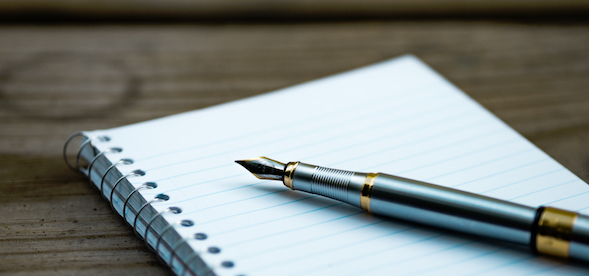
by Jenna | Jul 26, 2017 | Writing Articles
Last week I shared Part I of this post about the many faces of procrastination, and the underlying reasons it shows up. It's not necessarily "just" writer's block or laziness, which are the common explanations I hear.
There are actually a number of variations on the theme of procrastination, and it's usually driven by something deeper, like feeling stuck, being overwhelmed, being hooked by perfectionism, or wrestling with past creative wounds that need addressing -- some of the examples I wrote about last week.
Let's look at a few more of these writing-stoppers that show up as procrastination.
You're creatively confused.
Creative confusion is one of the most fascinating causes for procrastination I've come across (perhaps because it's one of my personal "favorites"). Creative confusion will have you spinning in circles, not sure which direction to go with your story, considering multiple ideas and perspectives, and feeling unable to decide among them. It's as if everything suddenly has equal value and there's no differentiating them.
Part of the issue here is empowerment. When you forget that you're the architect of your story and that there's not necessarily a "right" way to write it, it's easy to get confused. Confusion can also be a smokescreen for the fear that you'll get it "wrong."
Antidotes: Make the shift into action by being willing to do the work of sorting through your ideas by putting them on paper and evaluating them as objectively as you can. One of the ways creative confusion keeps you stuck is that it all happens very quickly in your head. Get it down, and figure it out. And remember that you're the one in charge. It can also be helpful to talk it through with a trusted coach or writing pal who has your story's best interests at heart (not her ideas for what you "should" do).
You're feeling apathetic about your book (or script).
Creative boredom or apathy is another one of these super tricksters that can keep you locked into procrastination. You don't write because it feels like you've "just lost interest" in your story. Interestingly, this usually happens when you've just hit (or are about to hit) a major milestone with your story, or you're about to tackle the next stage. What's happening here is that a new level of fear is cropping up and putting the brakes on to minimize your risks of failure.
In other words, it ain't about the story.
Antidotes: Keep on keeping on. The only way out is through. While there may be passages in your book that are need work, that's a storytelling problem, not "time to give up on the whole project" problem. This is the place to commit to finishing, no matter what.
This is also a great time to remind yourself of your Why for the project -- why you started writing it in the first place. Sometimes just tracking back to the Why will be enough to get you in action again.
You're having trouble deciding which book to write.
This kind of procrastination turns up when you know you want to write or feel ready to write but you can't decide which story to work on, or you decide on one, only to change your mind in short order, usually telling yourself it's not good enough in some way, then look around for something else to work on, only to dismiss that one too. And the next one after that.
This kind of procrastination can also look like coming up with a bazillion ideas to work with but not being able to choose among them.
Antidotes: Check out my free downloadable guide about how to choose your next book (or script) using decision criteria and intuitive decision-making skills. You can also try one of my favorite bits of Steven Pressfield's wisdom, which is to "figure out what scares you the most, and do that first."
(If, on the other hand, you're totally drawing a blank for any ideas at all, try Elizabeth Gilbert's approach of paying attention to your faintest whispers of curiosity and see where they lead you.)
You've fallen out of the habit of writing and each day that goes by, it gets harder to restart.
If your writing practice has fallen apart -- for whatever reason -- procrastination has taken hold and it's just not getting any better. Each day you tell yourself you're going to write, but find endless distractions around the house, get caught up in work (or TV or candy crush!), tasks to take care of, or toilets to clean. This is "garden variety" procrastination in my book, but it's still a doozy.
Antidotes: Set a very small writing goal and meet it. Then do it again the next day. And the next. Keep going until you have the practice in place. Troubleshoot any obstacles that come up -- like falling into reading email or getting sucked into other tasks -- and find ways to streamline your path to your writing desk each day. If you set a goal, and you're still procrastinating, make the goal smaller until you actually do it. Get accountability to help you with this if you need it. (Work with me 1:1, for example.)
You're dealing with big personal changes.
Look, sometimes big life events happen and the idea of tackling writing at the same time feels (and may even be) impossible. Major illnesses, weddings, new romances, births, deaths, break ups, divorces, moves, and job changes are life changes that can get in the way of writing and then morph into "regular" procrastination even once the dust has settled. It's okay. It happens. But it's helpful to know how to deal with it when a big part of your identity is tied into being a writer and you start losing your sense of self while it's all happening, and then wonder who you are when it's done.
Antidotes: Be patient with yourself during the upheaval, and give yourself a little time for re-entry. You may want to have a "maintenance practice" of writing morning pages in place during these times, even as a placeholder until you can get back to your book or script writing efforts. Have a plan in place for how and when you'll reboot your writing once you've made it through the thick of the experience. If you find yourself still struggling with your identity after the fact, do some journaling or coaching work to help get you back in touch with yourself as a writer.
You're an adrenaline addict.
One of the most fascinating parlor tricks I see writers engaging in is creating an endless series of non-writing emergencies, deadlines, and disasters that make it impossible to write. This is procrastination at its peak form, because it becomes inarguable. Whatever "it" is, has become such an emergency, that it has to be done right now. At this point, it actually does. But when a writer lives this way, chasing from disaster to disaster, writing always gets to stay (safely) at the bottom of the pile.
The trickiest trick of all is that the purveyor of these hijinks deep down revels in the sense of excitement and in being the rescuer of the situation from certain doom. It turns out, writers who do this to themselves are addicted to the rush of it all, and they'll even design it so they "get" to write this way too (at the last minute, in a mad panicked rush).
This strategy does two things. It's a brilliant way of getting off the hook for doing your best work, because you simply can't, not with all those emergencies to take care of. It's also very clever way of getting an adrenaline boost of energy to face the terror of writing.
Antidotes: Admit the addiction. Make a conscious choice to stop this behavior. Learn to pace yourself -- with everything, including your writing -- and get ruthless about cutting out anything and everything you don't have to do. You don't have to do everything and you don't have to do it all perfectly. Cut some corners!
You're just plain tired.
Maybe you're not exhausted, but "just" tired. Maybe you haven't reached the point of creative burnout, like I mentioned last week, but maybe you have other non-writing commitments that tax you. Some of these are avoidable (volunteering for committees) and some are not (having little kids or an aging parent), but either way you're tired. This tiredness becomes an excellent excuse for procrastinating. "I'm tired," you say. "I just don't have it in me today to write. I'll do it tomorrow."
Antidotes: I've always loved the quote from David Whyte on this subject, “You know that the antidote to exhaustion is not necessarily rest? … The antidote to exhaustion is wholeheartedness.” When it comes to the daily sort of tiredness that can leave us feeling run down (as opposed to massively burned out), writing regularly -- even just in small amounts -- is often the cure. Also, take a look at how you're investing your precious life energy and see where there might be energy leaks you can shore up. Look for where you're not feeling a "Hell, yes!" about the things you've committed to and think about letting them go. Work with a friend or coach to inventory your commitments and see what you can release for someone else to handle.
Photo by Igor Ovsyannykov on Unsplash

by Jenna | May 3, 2017 | Writing Articles
When you imagine yourself into your own future writing success, how does it feel? Is it exciting but terrifying, all at once? Do you imagine yourself changed irrevocably by your fame and fortune? Do you sense yourself being overwhelmed by attention, energy, and even money? Will you still be a good person?
Will success change you?
A Sneaky Kind of Resistance
I’ve seen in myself and others this terror of success manifesting as a very sneaky kind of resistance. We self-sabotage because we’re afraid we can’t handle the success. Another way to think of this is as an “upper limit problem,” where you thwart your future success by imploding in the here and now, even in the smallest of ways.
Does “I just don’t feel like writing today” ring any bells?
Under the terror is a fear of losing your very sense of self as a result of being successful. As if you'll be so overloaded with the intensity of success that you’ll transform into chaotic energy that floats you away into nothingness.
Sometimes we stop ourselves from writing because we’re afraid to fail.
And sometimes we stop ourselves because we’re afraid to succeed.
Symptoms of a Fear of Success
It could be as simple as procrastinating or being a perfectionist, but it might also look like taking on so many tasks that you can’t write, failing to do your best work, stopping just short of finishing project after project, fearing that you'll betray your loved ones if you succeed or are happy, or even allowing emergencies to erupt and backlogged work to accumulate so you can’t write (or write well) because you have too many demands on your time, space, and energy.
Interesting how those symptoms match both a fear of failure and a fear of success, isn't it?
Addressing a Fear of Success
But the solution for moving past the fear lies in understanding which fear it is.
Having a fear of failure means needing to adjust your mindset about what failure means.
If you're struggling with a fear of success, though, the solution lies in bringing yourself into the here and now, into this moment, right now, reading this piece with me, and remembering that you get to decide how to handle your life. You’re the author of your present, and your future. You get to practice being grounded, centered, present, and calm, right now, right here. You get to make decisions and plans for your money, time, and energy now, so that when success arrives you're well prepared for it.
So just breathe with me, right now. Notice the air, the light, the sounds around you. Take a deep inhale, and then let it go. You don’t have to worry about the future right now, because you're getting ready to be your future self, one step at a time.
Your job, right now, is to calm and soothe yourself. To bring your attention back to the work you’re doing right now. The learning you’re having right now. One step at a time.
Enjoy it.

You may also like:

by Jenna | Mar 8, 2017 | Writing Articles
Morning pages are something I mention fairly often here at Called to Write, but haven't ever defined. Many writers are unfamiliar with the concept.
Morning pages are a writing tool created by Julia Cameron and described in her book The Artist's Way: A Spiritual Path to Higher Creativity*.
The core idea is to write three long-hand, stream of consciousness pages every day, first thing in the morning upon awakening, no matter what, even if you only write, “I don’t know what to write,” over and over again.
How to Write Morning Pages in 3 Easy Steps
Here are three easy steps to help you get started writing morning pages:
Step 1: Get yourself a notebook to write in (and put it somewhere you'll find it quickly and easily in the morning).
I like something with half-size sheets so that it doesn't take me all day to fill the pages. My favorite is this steno notebook*, because I love the paper weight and the size of the pages. I prefer using something a little more disposable like this than a fancy journal since I don't want to feel attached to them. Though I've kept all of my many notebooks so far, I expect to eventually have a bonfire with them and I don't want gorgeous leather-bound books energetically stopping me from letting go. I keep my notebook with my favorite pen tucked into my nightstand for easy retrieval upon awakening.
Step 2: Write three pages — about ANYTHING — when you wake up.
I love to write morning pages before I do anything else other than make a quick trip to the bathroom and put in my contact lenses. Then I hop back in bed and write. My pages tend to take me about 20 minutes. Some writers prefer to get up and make coffee or tea, and sit in a cozy spot to write their pages. If you're tempted to stop short of three pages, I highly recommend pushing through. There's so much insight that happens once you get deeper in (usually about the 2.5 page mark) -- don't miss it. Don't worry about what you're writing -- just write whatever is swirling around in your brain, even if it's boring, whiny, ridiculous, or pointless. It doesn't matter.
Step 3: Repeat the next day... and don't look back.
Write the next day, and the day after that, and the day after that. Morning pages are one of those tools for life that are worth holding onto. Especially in the early days of writing morning pages, don't re-read your pages. Julia Cameron even recommends stapling the pages together when you first start so you aren't tempted to go back. Just put the words on the page, and move on. It's a tool, not a record.
5 Reasons You'll Want to Write Morning Pages
Some pretty amazing and miraculous things start happening once you've been writing morning pages for a while. Here are five reasons you'll want to make them part of your regular writing routine:
1. Morning Pages Lead to Creative Recovery
Morning pages are a powerful tool for creative recovery. Many writers and artists experience creative burnout at some point and struggle to regain their creative footing and orientation. Writing morning pages helps us find our way back to our creative selves.
Morning pages also are a way to "rest" on the page -- a way to keep the words flowing even if you're feeling blocked with writing your book or what to write next, and can be a "bridge" to keep you writing between finishing a draft and tackling your next revision when you don't want to lose your writing habit and momentum.
Writing pages this way also helps free us from perfectionism. Since we're writing without editing or for publication or even for sentence structure, it gives us great practice at letting the words flow freely without judgement or internal censorship.
2. Morning Pages Prepare Your Mind for Creative Insight and Discovery
Writing morning pages will help you clear away any angst, fear, worry, and doubt -- in any area of your life. Morning pages are not journal pages -- you aren't (necessarily) going to be recording your life experiences through your morning pages. Instead, use them to purge the voices of negativity that hold you back. Get them out onto the page and out of your head, so you can move to your writing with a lighter heart and fresher spirit. So go ahead and vent and complain. Get it all out and leave it behind you.
What's so cool about this is that it helps you quiet your mind. And a quieter mind is one better prepared for creative insight and discovery.
3. Morning Pages Foster Self-Trust and Honesty
Morning pages require honesty. Writing every day about what bothers you and what’s going on has a way of surfacing truths for your attention and recognition. You just can't get away with complaining about the same thing over and over again without feeling called to make a change. You'll notice what’s working and what's not working in your life. And as you listen to yourself, you'll build trust with yourself and your inner wisdom because you'll be noticing over and over again where your inner voice is giving you information about what's going on -- and you'll see the evidence of it.
4. Morning Pages Are an Antidote to Self-Forgetting
Morning pages are a powerful antidote to self-forgetting. When you write morning pages, you'll reconnect with yourself. In my experience, it can be challenging to “come back to yourself,” especially in a world where busyness and materialism abound (and especially as a sensitive, intuitive, introverted writer). All the noise around us can make us feel lost and disconnected from ourselves, and morning pages bring us back to who we are.
A writer who knows herself is better able to deliver her highest quality work.
5. Morning Pages Are a Pathway to Self-Acceptance
Once you’ve stepped into this place of consciousness, it’s hard to go back. Fundamentally, morning pages give you permission to be who you are. They are a pathway to a radical form of self-acceptance. By being true to yourself and fully expressing all of yourself without judgment, you honor the truth of who you are.
Personally, I have found morning pages invaluable, from plain-old venting to accessing powerful insights. I use my pages to whine, moan, and complain. I unload my greatest fears and my deepest desires. And I ask for guidance from my inner self. It's an incredible way to clear your mind and listen to your heart.
Answers to Common Questions About Morning Pages
- Do I have to write morning pages in the morning? Yes. :) Though you get to make your own rules for yourself, and of course no one can tell you there's anything you HAVE to do with your writing. At the same time, this is such an incredible writing tool it's worth experimenting with as prescribed.
- Do I have to write morning pages long-hand? Julia Cameron (and I) both recommend writing morning pages long-hand. There's something incredibly transformative about writing your pages out by hand. And... there's a pretty nifty site called 750words.com as an option for writing pages online. You could certainly use ByWord or Scrivener as well (two of my favorite writing tools).
- What's the different between morning pages and journaling? The main difference between morning pages and journaling is that morning pages are about ANYTHING. It's about clearing out, writing stream of consciousness style, about whatever is circling your brain. Journaling can be the same, of course, but it tends to more "about" something, such as recording your day, or exploring a particular issue. And while that happens sometimes in morning pages, it's just as often as not complaining about errands we have to run or other things we're processing.
- If your writing time is limited, is it better to just focus on your book than on doing morning pages? Maybe yes, maybe no. I've made the choice for the last couple of years since baby #2 to focus on my primary writing projects rather than doing pages because time (and sleep!) has been at such a premium. And... I've dearly missed them. I've gone to doing a morning journal check-in lately instead, but I'm going back to morning pages too.
- Can I share my pages with other people? I don't recommend sharing your morning pages with anyone else, ever. Part of the magic and what's makes them so powerful is that they are completely private and sacred. We can't fully reveal ourselves on the page when we're holding back for fear of what someone else might think. So keep them just for you, and protect yourself that way. This is great practice for learning to more fully reveal yourself when writing stories and books as well.
- Can I write evening pages instead? If you want to, though really, they ARE quite different animals. You might find that you want to do both. My colleague Jill Winski just wrote a post about writing evening pages in addition to her morning pages. Similarly, The Ultimate Writer's Toolkit includes a set of morning and evening journal prompts, but focused on writing only. The progress journals that the writers keep in my Called to Write community can also somewhat fulfill the end of day writing "check-in" role that evening pages can play, but again, only around that day's writing. My take: write morning pages to write morning pages, and use your other tools to fulfill their unique purpose rather than making substitutions.
* Affiliate link

by Jenna | May 19, 2016 | Writing Articles
As the proprietress of an online program designed to help writers build a daily writing habit, every once in a while someone says to me, "But Jenna, what if I don't want to write every day?"
My answer is, "That's okay."
If....
The reason we advocate daily or near daily writing in my writing community is that most of the time, the writers who come to us are flat out struggling to write -- at all. And it turns out that the more frequently you write, the easier it is to sustain the habit.
Some writers CAN write on a different schedule and it works perfectly well for them. That's completely fine. I have no objections. Because if you're someone who can write two to three times a week and keep that going over the long haul, that's great! Or if you like to go for months without writing and then have no problem cranking out a book without getting burnt out or frazzled, all the more sparkle bright ponies for you. Really.
But if you're someone who wants to write but isn't, or isn't living up to your desired level of productivity and completion, or keeps getting burnt out in binge-writing frenzies, or is wrestling with procrastination, burnout, perfectionism, or writer's paralysis, you might want to try our daily/near daily approach. It just makes it so much easier to break the patterns you're stuck in.
The thing is, a tremendous amount of paralysis that can build up for writers. It's all founded in fear -- fears of not writing well enough, of succeeding or failing, of public humiliation or ridicule, and more. All that fear builds up in our unconscious minds and sends us in an entirely OTHER direction than writing. But when we first break that pattern of writing-aversion and turn toward writing again with a small, doable step like writing for five to fifteen minutes, we can build new neural connections that reinforce writing as a positive thing in our lives. And if we do it again the next day, it makes it easier and easier to keep going. And once we build our writing up to habit levels, we start operating out of a whole new paradigm, one where taking a day off here or there doesn't throw us completely off track.
No matter what though, the bottom line is this: Do what works for you. There is no one right way to write. There's no one right answer to how to write. Different approaches work for different people. Find yours.

by Jenna | Jun 18, 2015 | Writing Articles
I get kind of pissed off when people say there’s no such thing as writer’s block.
People say “you don’t ever hear of plumber’s block, do you?”
And, “Writers write. If you’re a writer, write.”
Which, yeah.
I agree with that.
Writers write.
But not when they feel stuck.
But if you think about it carefully, doesn’t writers block really mean “feeling unable to write”?
And isn’t it a bit ridiculous to tell someone there is no such thing as the feeling they are feeling?
I think it is.
One of my coaches, Jessica Michaelson, says there are no rules governing our inner emotional sanctuaries.
We get to feel how we feel. We may chose to take action that is different than how we feel – like not throwing the baby out the window when he wont stop screaming ;) or choosing to write when we are not in the mood (which is not the same thing as feeling blocked by the way) – but we may still feel angry and at wit’s end, or grouchy and out of sorts, and that’s perfectly okay.
In fact, I’m not at all sure how it helps someone who feels blocked to invalidate how they are feeling.
I will say, however, that what worries me is how writers usually chose to deal with writer’s block, and what they make it mean in their heads.
Lots of writers who feel blocked just stop writing and flat out hide. Or go around complaining that they are blocked as if they have no ability to make any kind of change their own lives.
I get equally pissed off by people who don’t choose to take action to help themselves, even if it’s a matter of reaching out for help to someone like me or any of the other wonderful writing coaches and mentors out there in the world.
But there’s a reason why we don’t.
It’s shame.
Shame is what makes us hide and stop reporting our results or asking for help.
Shame makes us say “I should be writing.”
And, “But I can’t.”
And that’s the part of me that doesn’t get pissed off but instead wants to come sweeping over to your house and give you a big giant hug and tell you it’s all going to be okay. And then make you a cup of tea and talk, really talk, about what is going on inside that head of yours and help you make a real plan for how you will start to shift and change it, with me holding your hand every step of the way.
Writing is a lonely business.
Feeling blocked is even more so.
It’s not fair to compare it to a chronic illness or depression, but in some ways it’s just as soul crippling.
And as someone who is in the business of helping people honor their soul’s calling, it’s one of the challenges I most love helping you overcome.





